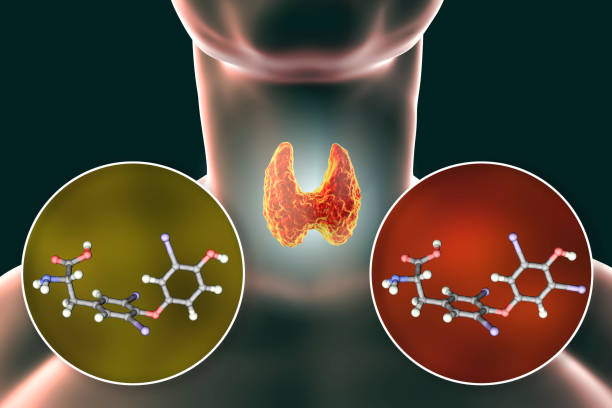Are you experiencing rapid weight gain, excessive hair growth, irregular menstrual cycles, acne, or difficulty conceiving? If this is the case, you most likely have Polycystic Ovary Syndrome (PCOS). While dealing with this condition can be aggravating, educating yourself can help you feel more in control.
Understanding Polycystic Ovary Syndrome
A good starting place is to define polycystic ovary syndrome.
Polycystic Ovary Syndrome is a hormonal imbalance that affects millions of women during their reproductive years. This condition develops over time as a result of insufficient progesterone production. Ovulation is prevented by a lack of progesterone, which increases testosterone production by the ovaries.
This hormonal imbalance can result in irregular or missed periods, acne, excess body/facial hair, male pattern baldness, weight gain, and, in some cases, infertility. Polycystic ovary syndrome can also lead to insulin resistance and high blood sugar levels, increasing the risk of developing type II diabetes.

What Are the Symptoms of PCOS?
As previously stated, PCOS is the most common hormonal disorder in women. More than 5 million American women have PCOS, but more than half of them are unaware of it. Knowing the symptoms of PCOS is critical in order to identify it in yourself or a loved one. The polycystic ovarian syndrome is characterized by three major symptoms:
Irregular periods
Having irregular or few menstrual periods is a common symptom of PCOS.
Ovarian cysts
When your ovaries are larger than normal, follicles or fluid-filled sacs may form on their surface, causing the ovaries to malfunction.
High levels of androgen
Excessive facial and body hair can be caused by high androgen hormone levels. Male pattern baldness and acne may occur in severe cases.
PCOS may also cause other symptoms, including:
- Infertility
- Extra hair growth on the face and body
- Dark skin patches
- Weight gain
- Skin tags
- Depression
If left untreated, PCOS increases your chances of developing serious conditions such as cardiovascular disease, diabetes, sleep apnea, and pregnancy complications. Early detection and treatment of PCOS can help reduce the risk of developing these diseases.
How to Treat Polycystic Ovarian Syndrome?
PCOS treatments aim to manage symptoms while also lowering your risk of long-term health problems such as heart disease and diabetes. Your specific needs will determine the type of treatment you will receive. If you are having difficulty conceiving, your treatment will focus on getting you pregnant. If you have PCOS-related acne, a dermatologist may be able to treat it topically.
Lifestyle Changes
Eating a healthy diet and exercising regularly are two of the most effective ways to deal with PCOS. This is particularly true for overweight women. Simply losing 5% to 10% of your body weight can result in a significant improvement in PCOS. Weight loss may also help with ovulation and blood sugar issues. Regular exercise and a healthy diet can help you lose weight.
When a healthy diet and regular exercise are insufficient, you may require medication to help you lose weight. Different drugs work in various ways. Your doctor will prescribe the medication that he or she believes will be the most effective for you.
Medicines
There are several medicines available for treating the symptoms of PCOS. They include:
Hormonal Irregular or absent periods
The polycystic ovarian syndrome cannot be cured with birth control. However, it is frequently prescribed as a first-line treatment for irregular periods following or in addition to lifestyle changes. Oral contraceptives, which help to regulate the menstrual cycle while lowering testosterone levels in the body, may be prescribed by your doctor. It is important to note that oral contraceptives are not the best treatment because they are associated with a number of risks.
Fertility issues
Most women who are experiencing fertility issues can conceive with treatment. Most women can be treated for infertility with a short course of tablets such as Clomiphene. Because it promotes ovulation, clomiphene is usually the first treatment recommended for women with PCOS who are trying to conceive. Metformin, gonadotropin hormones, and letrozole are some of the other medications.
If these are unsuccessful, your doctor may recommend In Vitro Fertilization or IVF.
This procedure involves fertilizing your egg in a laboratory with sperm cells. After fertilization, the embryo is returned to the mother’s uterus. When you have PCOS, this may be the best way to get pregnant, but it can be quite costly. This treatment also increases the risk of multiple pregnancies.
Unwanted hair growth and hair loss
Polycystic ovary syndrome can occasionally result in excessive hair growth or loss. This condition can be treated with medications. Treatment options for PCOS-related hair loss include:
- Hormonal birth control: Birth control pills and other hormone contraceptives can also treat acne and unwanted hair growth.
- Medicines: If birth control doesn’t work, your doctor may prescribe drugs to control excessive hair growth and loss. This medication may include spironolactone, flutamide, cyproterone acetate, and finasteride. These drugs work by blocking testosterone and ovarian androgen production. However, you should not take it if you are pregnant or plan to get pregnant, as it can cause congenital disabilities.
- Depilatories: These are gels, lotions, and creams that break down the protein structure of hair, so it falls out of the skin.
- Electrolysis, or laser therapy, is the use of an electric current to destroy the roots of individual hairs. It will take several sessions to remove all of the hair. Even if some hair grows back, it will be finer and less noticeable.
Surgery
Another option for treating PCOS-related fertility issues is laparoscopic ovarian drilling (LOD). If ovulation medication does not work, this surgery improves the function of your ovaries. Under general anesthesia, the doctor makes a small incision in your lower belly and inserts a laparoscope with a needle into your ovary, destroying a small portion of it.
After that, the ovaries will be treated with a laser or heat to destroy the tissues that produce male hormones such as androgens. This procedure causes a change in your hormone levels, making ovulation easier.
LOD also lowers levels of luteinizing hormone and testosterone. It also raises levels of the follicle-stimulating hormone. As a result, it corrects your hormone imbalance and can restore the normal function of your ovaries.
Hormone Replacement Therapy
The majority of PCOS symptoms are caused by hormonal imbalances affecting testosterone, progesterone, and insulin levels. For women who want to reverse the symptoms of PCOS, hormone replacement therapy is an excellent treatment option. It is an effective treatment option because it addresses any underlying hormone imbalances directly.
Hormone replacement therapy can effectively treat these imbalances by supplementing deficient hormones with low physiological doses of the appropriate hormones to restore optimal levels. Because they are made from plant extracts, the replacement hormones used are natural. They resemble hormones found in the human body. When the correct dosage is used, side effects are almost non-existent.
Women with PCOS have elevated testosterone levels. Reducing this hormone can aid in the treatment of PCOS. Because several factors contribute to elevated testosterone, treatment is frequently multifaceted. A low-carbohydrate diet may help to control blood sugar levels caused by insulin resistance.
A decrease in progesterone may result in an increase in testosterone. To return this hormone to normal levels, we replenish progesterone levels with bioidentical progesterone. This treatment replenishes progesterone levels and promotes more natural androgen production regulation. Addressing progesterone deficiency for two weeks each month with hormone replacement therapy may help the brain develop the daily rhythm that is missing in PCOS.
Overall, many women require lifestyle changes as well as medication to effectively treat PCOS. Your doctor should design a treatment plan for you that is specific to your symptoms.
Visit Meridian Health for Hormone Replacement Therapy in Atlanta, GA
Meridian Health and Wellness understands how important hormone balance is to quality of life and can assist you in finding the right combination for you. We are experts in providing high-quality gynecological care and have extensive experience diagnosing and treating PCOS. Our procedure is designed to deliver hormones that are specifically tailored to your needs. To do so, we start with a detailed questionnaire to determine the severity of your PCOS and the involvement of other endocrine functions such as your adrenal glands and thyroid.
If you are over 40, we will perform extensive blood tests to determine the levels of three hormones. Our experts use these findings to develop a treatment plan for PCOS that addresses hormonal imbalances and nutritional deficiencies. Depending on your condition, we may use capsules, creams, or pellet therapy to combine conventional medicine with high-quality nutraceuticals, integrative medicine, and hormone replacement therapy.
If you think you are suffering from PCOS, contact our clinic at (470) 344-5780 to schedule an appointment or learn how our hormone replacement therapy can help you overcome your problem.



